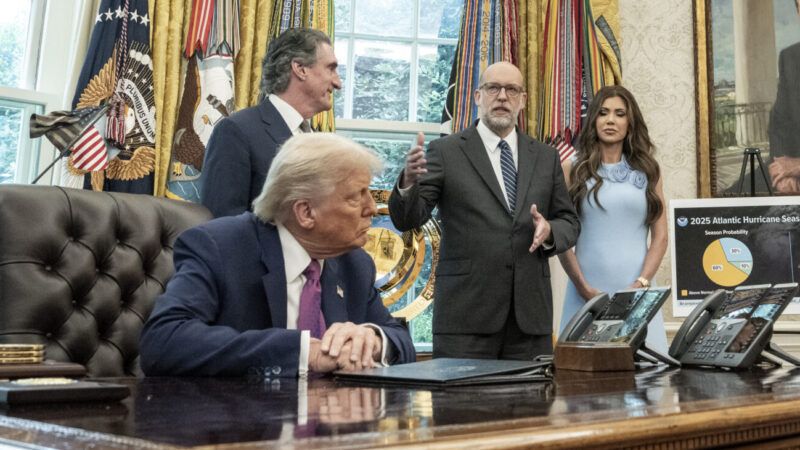Trump's $4.9 Billion 'Pocket Rescission' Violates Federal Law and Usurps Congressional Authority
Congress holds the power of the purse in our system of government, and further eroding congressional responsibility for spending decisions will not end well.

President Donald Trump's decision to cancel nearly $5 billion in federal aid without congressional authorization appears to be a straightforward violation of federal law.
The White House announced Friday morning that Trump would nix $4.9 billion in foreign aid by simply refusing to spend the money. The so-called "pocket rescission" would include $3.2 billion from the United States Agency for International Development (USAID) and about $1.7 billion from various State Department programs that distribute funds to international organizations and peacekeeping efforts, according to The New York Post, which first reported on the maneuver.
While that spending might be wasteful or foolish, the president does not have the authority to refuse to spend money that has been appropriated by Congress—though the Trump administration seems eager to challenge that limitation on executive power.
"Congress can choose to vote to rescind or continue the funds—it doesn't matter," the White House said in a statement to Politico. "This approach is rare but not unprecedented."
Of course, something can be rare and not unprecedented while still being unlawful.
The laws that govern the federal budget process—most importantly, the Impoundment Control Act of 1974 (ICA)—allow presidents to make rescission requests to Congress. Trump did that earlier this year, and lawmakers followed through by cutting $9 billion in previously approved spending. The law also allows the executive branch to freeze funding for up to 45 days while Congress considers such a request.
Ross Vought, the director of the White House budget office, has argued that the executive branch can use that 45-day window to do exactly what Trump is now attempting: cancel any spending during the final 45 days of the fiscal year, which ends on September 30. "By withholding the cash for that full timeframe—regardless of action by Congress—the White House would treat the funding as expired when the current fiscal year ends on Sept. 30," Politico explained earlier this year.
Vought is wrong about that.
"The President has no unilateral authority to impound funds," the Government Accountability Office (GAO) concluded in 2018 when it was asked by the House Budget Committee to examine the question of pocket rescissions. "We conclude that the ICA does not permit the impoundment of funds through their date of expiration. The plain language of the ICA permits only the temporary withholding of budget authority and provides that unless Congress rescinds the amounts at issue, they must be made available for obligation."
Indeed, if the president were allowed to cancel any federal spending within the final 45 days of the fiscal year, then he could effectively cancel any federal spending at any time—by delaying the release of funds until the end of the year, then canceling them.
Tempting as that might sound to anyone who wants to see the government spend less money, the administration must follow the legal processes for budgets and rescissions. Congress holds the power of the purse in our system of government, and further eroding congressional responsibility for spending decisions will not end well.
Republicans in Congress have been openly critical of the White House's talk about implementing pocket rescissions. Now that the Trump administration has taken this step, the responses from Republican lawmakers will be telling.
"This is an apparent attempt to rescind appropriated funds without congressional approval," Sen. Susan Collins (R–Maine) said in a statement to The Hill on Friday. "Any effort to rescind appropriated funds without congressional approval is a clear violation of the law."
She's right. If the Trump administration wants to cut spending—which is, again, a laudable goal—then it should work through the budget and rescissions process to accomplish those goals with congressional approval.
Vought has argued that the ICA is unconstitutional, so the Trump administration could also try to get the law overturned in court (which may be the ultimate goal of Friday's maneuver, if it sparks a legal challenge). Alternatively, the White House could ask Congress to amend the ICA to allow pocket rescissions.
Currently, the law does not permit that, which means the White House is once again flouting federal law in its pursuit of greater executive power.
